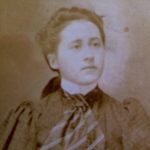“Career Speed Dating”

 I’d seen it on TV. Stressful and almost silly as people jumped from potential date to date, wondering if someone would choose them and find a match. And as I watched it, I was so glad that I’m happily married and would never have to do that!
I’d seen it on TV. Stressful and almost silly as people jumped from potential date to date, wondering if someone would choose them and find a match. And as I watched it, I was so glad that I’m happily married and would never have to do that!
But then, there I was at ACFW, and it felt like speed dating. Butterflies. Nerves on edge. Sweaty palms. Wondering if I’d find a match. It just didn’t make sense.
I had been in the editor’s seat, taking author appointments, for years. Dozens of them. As an editor, I had worked so hard to put each potential author at ease with a smile and a dish of candies. I’d chatted with them and encouraged them in their writing journey. I’d given gentle and kind guidance (never crit!) and tried to help them along the way. I was kind, sweet, friendly, courteous. And it was exhausting to take appointment after appointment and talk, discern, counsel, and gently say ‘no’ to some.
But now I was that author waiting with a dozen others to “pitch” my story to an editor, and I was nervous as a little kitten. Would they laugh? Would they reject me…I mean, my story?
I went to my first appointment and found a welcoming and smiling face. The editor quickly put me at ease with a laugh and a chat before my “pitch”. She was affirming, interested, and encouraging, and I walked away pumped.
My second appointment found a wilted and weary soul who did her best to explain her publishing house and why my project was not a fit. And I was fine with that. I left the meeting and prayed for her—for strength and for wisdom. I knew how she felt.
At my third appointment, I felt like I had found a kindred spirit. Charlene was jovial, generous, and gracious. She was excited about my project, even counseling me to “hurry up and finish it!” Yes, Ma’am! I’m right on it.
So my “career speed dating” wasn’t as difficult as I had thought it would be. In fact, it was fun!
When have you found yourself unnecessarily nervous and why? I’d love to know!
Great Expectations

 As I booked my flights for the American Christian Fiction Writers (ACFW) confererence, it dawned on me. I’ve been going to writers conferences for over 15 years, but this is the first time I’ve solely gone as a writer!
As I booked my flights for the American Christian Fiction Writers (ACFW) confererence, it dawned on me. I’ve been going to writers conferences for over 15 years, but this is the first time I’ve solely gone as a writer!
I’ve been on the faculty for dozens of conferences. I’ve taught workshops, had appointments with writers, sat on the other side of the table from those trembling, nervous writers hoping I’ll say “yes” to some of their writing. Now I’ll be on that side of the table. Wow!
I’m especially excited about this conference. It’s the first one that’s completely for fiction writers, and now that I’ve made the transition from non-fiction writing to writing novels, I can’t wait to be in the thick of things with like-minded creatives.
So I took a few minutes to assess my expectations in hopes it’ll help me (and you when you attend a conference) to be realistic about my expectations and prepared for the adventure of the conference. Here goes:
I expect to have a blast! I’ve always enjoyed the excitement, energy, and fun of conferences, so now that I don’t have to teach or have meetings all day, I expect to soak it all in and enjoy the journey.
I expect that I’ll learn so much in the general meetings and in the workshops and as I meet people that I’ll nearly burst with new knowledge. As a lifetime learner who thrives on learning, fill me up, and away I’ll go. I can’t wait!
I expect I’ll meet a whole bunch of kindred spirits. Since we writers are a unique lot, it’ll be awesome to renew friendships, meet new friends, and connect with like-minded folks who just want to serve God through their writing.
I expect that I’ll be a bit nervous when I meet with the editors who are or will be looking at my first completed novel. Though I’ve been on that side of the table, this will be new to me, but I’m still looking forward to it.
I expect I’ll recharge my batteries even though I’ll get little sleep and be exhausted by the time I leave. There’s nothing more energizing than inspiring speakers, great worship, making new friends, and experiencing a conference to keep me up at night, get my creative juices flowing, and recharge my imagination.
I expect to have good food, great conversations, and divine moments.
I expect to participate in some great times of worship and prayer and moments with God.
I expect I’ll have some new adventures, new experiences, and new inspirations that I can’t even imagine.
All I can say is…bring it on!
What is the best part of going to a writers conference for you? I’d love to know!
Be-Atitudes of a Writer

 As I began to write my second novel, The Fabric of Faith, I heard a sermon on the beatitudes. I’d heard a dozen or more sermons on that topic before, but as I pondered what the preacher talked about, I couldn’t help but applying it to the writing life.
As I began to write my second novel, The Fabric of Faith, I heard a sermon on the beatitudes. I’d heard a dozen or more sermons on that topic before, but as I pondered what the preacher talked about, I couldn’t help but applying it to the writing life.
Matthew 5 says that Jesus taught the multitudes, saying, “Blessed are the poor in spirit: for theirs is the kingdom of heaven. Blessed are they that mourn: for they shall be comforted. Blessed are the meek: for they shall inherit the earth. Blessed are they, which do hunger and thirst after righteousness: for they shall be filled. Blessed are the merciful: for they shall obtain mercy. Blessed are the pure in heart: for they shall see God. Blessed are the peacemakers: for they shall be called the children of God. Blessed are they, which are persecuted for righteousness’ sake: for theirs is the kingdom of heaven. Blessed are you, when men shall revile you, and persecute you, and shall say all manner of evil against you falsely, for my sake. Rejoice, and be exceeding glad: for great is your reward in heaven: for so persecuted they the prophets which were before you.”
How can we apply the concept of “be-attitudes” to our writing life, our creative life, or just life in general in a new and fresh way? Although not in order of Matthew’s beatitudes, here’s what I came up with:
- Be patient. Writing is perfected over time.
- Be content. Enjoy the journey and stop wanting more.
- Be prepared. Learn all you can about writing.
- Be proactive. Schedule writing time and remember, you reap what you sow.
- Be clear. Communicate well.
- Be tenacious. It doesn’t matter how you feel; if God’s called you to write, never give up.
- Be doers. Write! Write! Write!
- Be connected. Find other writers and do life with them.
- Be dead. Die to your personal plans and live for God’s plans for your writing life.
But Jesus wasn’t finished. He went on to say, “You are the salt of the earth: but if the salt have lost his savor, wherewith shall it be salted? it is thenceforth good for nothing, but to be cast out, and to be trodden under foot of men.”
How can we “salt” our writing to make our readers hungry and thirsty for Him?
And then Jesus said, “Ye are the light of the world. A city that is set on an hill cannot be hid. Neither do men light a candle, and put it under a bushel, but on a candlestick; and it giveth light unto all that are in the house. Let your light so shine before men, that they may see your good works, and glorify your Father which is in heaven.”
Writers, creatives, and friends, let your light shine!
What other be-attitudes would you add to this list? I’d love to know!
Character Development

 As a fiction writer, developing the characters in my books is a journey into psychology, anatomy, and sometimes chemistry! Sheesh! I never thought I’d have to go back to science class to write a novel. But sometimes I do.
As a fiction writer, developing the characters in my books is a journey into psychology, anatomy, and sometimes chemistry! Sheesh! I never thought I’d have to go back to science class to write a novel. But sometimes I do.
In my second book of The Irish Quilt Legacy, The Fabric of Faith, one of the characters suffers from post-partum depression. Though I never went through that with my two babies, I know friends who did. They were sad, quiet, withdrawn, and depressed. Yet I really never researched the “whys”—until I created a character, which is experiencing this debilitating condition.
What is going on in the body, mind, and soul of a person who is depressed? My research is giving me a measure of love and compassion that I wished I’d have shown to my friends when they were going through it. And the compassion for this condition will undoubtedly show up in my story.
The bottom line is, fictional characters need to be fully developed and not just stereotypes. They need to be relatable and have emotions and feelings that readers can really connect with. And they need to have likes and dislikes, quirks and mannerisms, fears and dreams, and thoughts. They need to worry and fret, desire and long, get angry and resentful, forgive and have faith, just real people. And they need to experience life similar to your readers, even if the character lives centuries apart from today’s readers. They have to make hard choices and face tough challenges and struggle with life. And they need to wrestle with issues of faith and God and eternity.
So as I develop each of my characters, I must fully engage with them and “know” them deep within their soul. I need to know their emotional makeup and the psychological quirks and the scars and the pain they’ve experienced. I need to know their physical assets and weaknesses, their fears and their dreams and their beliefs about God. Then they become real, and in that reality they can live their lives in the story.
How do you connect with the characters you create? I’d love to know!
Toning Up Your Novel

 When I was the editorial director over nine very different publications at the same time, I had to be keenly aware of the audience, tone, slant, and style of each article for all the various publications. One magazine was for pastors; another for single parents, and yet another for empty nesters. One newsletter was for new parents; another for parents of teens. One was for parents of tweens; another for parents of grade-schoolers. Each article for each magazine or newsletter needed a tone that would meet the needs of the audience and speak to them in a appropriate way.
When I was the editorial director over nine very different publications at the same time, I had to be keenly aware of the audience, tone, slant, and style of each article for all the various publications. One magazine was for pastors; another for single parents, and yet another for empty nesters. One newsletter was for new parents; another for parents of teens. One was for parents of tweens; another for parents of grade-schoolers. Each article for each magazine or newsletter needed a tone that would meet the needs of the audience and speak to them in a appropriate way.
But what is “tone”? As a language arts teacher for grades four through eight and later as an editor for more than a dozen years, I had to assess the tone of thousands of manuscripts that crossed my desk. As a conference speaker and writing coach, I’ve had to critique hundreds of writing samples and instantly give my thoughts.
Basically, “tone” is the author’s attitude toward the subject of the article or story. Is the tone of your writing happy, sad, fearful, angry, serious, humorous, pessimistic, optimistic? You can use just about any adjective you can think of—anxious, depressed, elated, euphoric. The tone of your writing creates the mood that the reader feels as he or she reads your work. Remember when your mom said, “change that tone, young lady!” when you were disrespectful? Your tone created a mood for your mom, and it wasn’t a good one!
In my first novel, The Fabric of Hope, several characters struggled with seeing their futures through a lens of hope, as I did years ago. Although the tone somewhat reflects what I experienced when I went through a traumatic divorce—a tone of feeling anxious and even fearful at times—hope finally triumphs as God helps the characters overcomes the challenges of life. Redemption is evident, and readers can journey through that change and learn how faithful God is.
How does the tone of your writing reflect your life? I’d love to know!
That Fearsome First Draft
 I’m working on the second book in The Irish Quilt Legacy, and if I’m not careful, I can get overwhelmed at such a daunting task. The fear of the blank page staring back at me on my MacBook Pro. The ominous Table of Contents that I know is empty of words and will probably change quite substantially over the course of the next several months. The 70,000-word or more word count before I get to “The End”.
I’m working on the second book in The Irish Quilt Legacy, and if I’m not careful, I can get overwhelmed at such a daunting task. The fear of the blank page staring back at me on my MacBook Pro. The ominous Table of Contents that I know is empty of words and will probably change quite substantially over the course of the next several months. The 70,000-word or more word count before I get to “The End”.
For me, the scariest thing is to realize that it’s only a “draft”. Are you kidding me? I sit at my computer for hours, days, weeks, months, and get to the end knowing it’s a “draft”? Eghads!
Personally, I like the word manuscript much better. It sounds so…polished and professional.
But what I’m writing now and in the weeks and months to come is really a draft of the manuscript. It will change, and sometimes it will change a lot. So I need to be pliable, willing to work with the Holy Spirit who, I believe, is guiding me along this writing journey.
Before, during, and after writing the first draft, one of the things I feel is most important is to bathe it all in prayer. Without Him, I can do nothing, even if I know all the novel writing tricks and have all the writing and editing skills at my fingertips. So I ask Him for wisdom, for creativity, for inspiration. I give Him my hands and my mind and my motives. And I implore Him to journey with me through every word of the story.
In my first novel, I experienced that a lot. I’d come to my computer and have just one sentence for my plot idea: “Maggie goes to The Irish Shop”. I’d sit down and wonder, “And? So what? What’s going to happen?” And guess what? I’d meet new characters or experience new events or get caught up in a really provocative conversation that would bring me to tears!
What a blast!
In reality, I have to simply be willing to be His scribe and go with His flow. I know, professionally, it’s called “free writing,” but I love to experience that deeper “scribing”—the parts of the story that He inspires and that rarely gets the cut when I get to the revising and editing stage.
I also have to remember to turn off my editing self. Since I was a professional editor of twelve different publications for eleven years, my editor self likes to rear her critiquing head up far too often. Sometimes she squeals like a naughty pig. Sometimes she roars like a lion. And sometimes she’s as wily as a weasel on a henhouse. So I have to put her in her place and banish her from my draft-writing world.
Then I write. Everything. I know that much of it will move or change or be deleted. And that’s okay. But sometimes a character will give me a glimpse into some fear or dream that I need to explore with him or her later in the story. Sometimes I see something or smell something or feel something, and when it all gets written down, I can later let the editor take over, move it or revise it, and clean it all up.
Most of all, I enjoy the journey. I set aside all the distractions and, like I mentioned last week, I go out to play. Whether it’s a draft, a manuscript, or the makings of the next great American novel, I’ll embrace the experience of birthing this baby!
Do you enjoy writing your first draft? If not, why not? I’d love to know!
